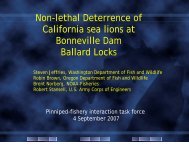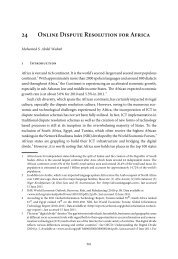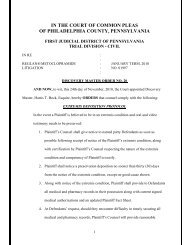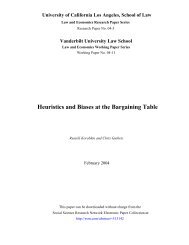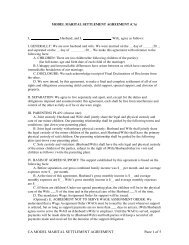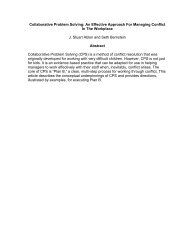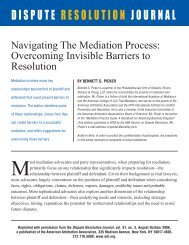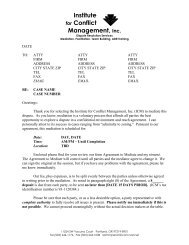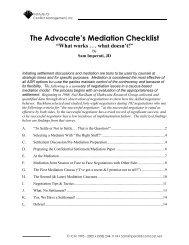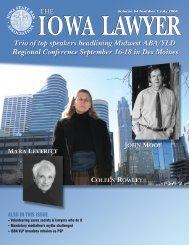17 e-Mediation - Mediate.com
17 e-Mediation - Mediate.com
17 e-Mediation - Mediate.com
Create successful ePaper yourself
Turn your PDF publications into a flip-book with our unique Google optimized e-Paper software.
Noam Ebner<br />
a supplement to basic mediation training – include considerations for suitability of<br />
e-mediation for specific cases, technology selection, managing confidentiality and security,<br />
online <strong>com</strong>munication skills and more.<br />
There is certainly much to explore in terms of content and methods for e-mediation<br />
training at the professional and pedagogical level. Practically speaking, experience with<br />
general ADR development has shown that regulation and accreditation of practice and of<br />
practitioners often spurs development of training programs. While this is not always a<br />
positive route to travel (as the incentives for training development be<strong>com</strong>e incentives to<br />
avoid further development of training programs), I will take the opportunity to segue into<br />
discussion of those two issues.<br />
4.3.2.2 Regulation and Accreditation<br />
The question of whether ODR regulation is desirable, or even possible, has been discussed<br />
with some particular attention being paid to e-mediation. As Sarah Cole and Kristen<br />
Blankley 94 summarized this somewhat prickly issue, “Policymakers who regulate traditional<br />
mediation attempt to balance four general goals: fairness, effectiveness, quality, and access.<br />
To the extent that regulation of online mediation is necessary, potential regulators of online<br />
mediation should add to that list: access to technology, effectiveness of process as <strong>com</strong>pared<br />
to traditional mediation, and quality of mediator services.”<br />
However, note Cole and Blankley (correctly, in my view), that not only does this give<br />
rise to internal dissonance – as these goals are sometimes in<strong>com</strong>patible with each other –<br />
they are challenged by the formidable external consideration that the Internet, by its very<br />
nature, resists regulation. They suggest that regulators prioritize carefully, and aim for<br />
small gains and not sweeping regulation of the field.<br />
The issue of regulation overlaps a connected issue, that of accreditation. One means<br />
of regulation is by setting up regulatory barriers for practicing in the field. Despite the<br />
relative novelty of the field, the question of practitioner accreditation has already been<br />
explored, likely due to the ongoing discussion of ADR accreditation. Indeed, Conley Tyler<br />
and Bornstein 95 begin their survey of accreditation models for ODR with an overview of<br />
accreditation models in the ADR field. While their discussion regards ODR in general and<br />
not mediation specifically, many of their suggestions are particularly relevant to practitioners<br />
of this process. They surveyed six organizations and service providers conducting some<br />
form of accreditation or screening process for practitioners, including government entities<br />
and <strong>com</strong>mercial bodies, examining them for entry hurdles to accreditation as well as for<br />
requirements posed to practitioners seeking to maintain their accreditation. Beyond regular<br />
94 S.R. Cole and K.M. Blankley, “Online <strong>Mediation</strong>: Where We Have Been, Where We Are Now, and Where<br />
We Should Be”, U. Tol. L. Rev. (2006) 38.<br />
95 M. Conley Tyler & J. Bornstein, “Accreditation of Online Dispute Resolution Practitioners”, Conflict Resolution<br />
Quarterly (2006) 23, 3.<br />
394



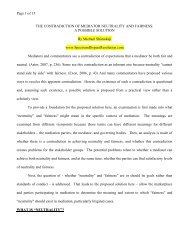

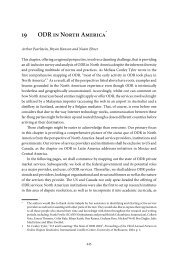
![Settlement Agreement Form [Agreement] - Mediate.com](https://img.yumpu.com/50682143/1/190x245/settlement-agreement-form-agreement-mediatecom.jpg?quality=85)
